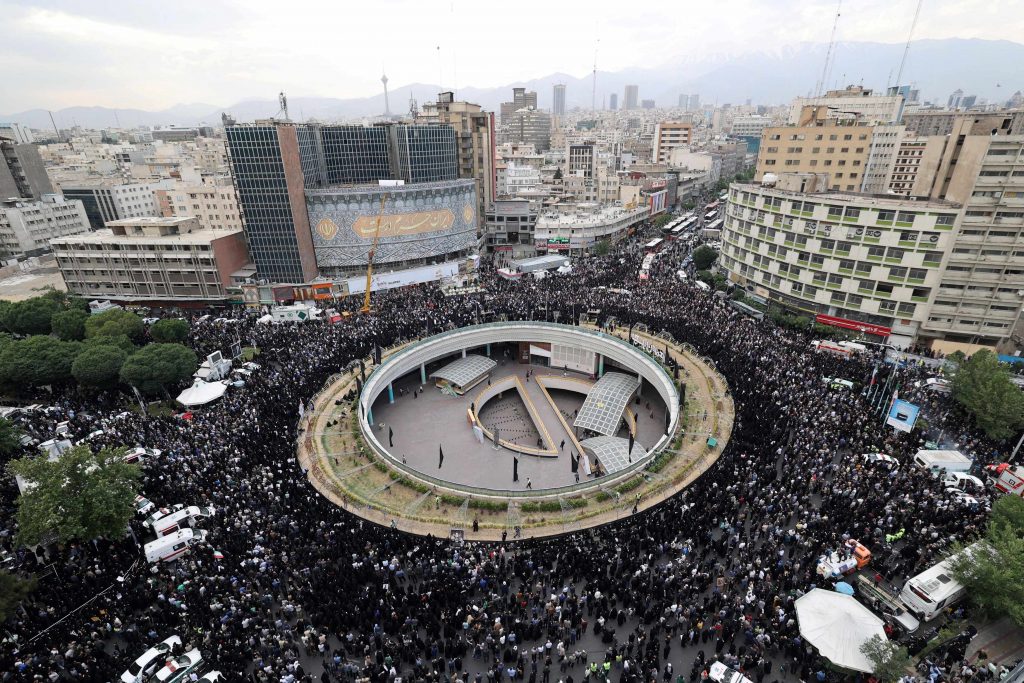Iranian President Ebrahim Raisi’s death has dealt an unsettling blow to the country’s politics and raises questions regarding the succession of not just the presidency, but also the most powerful position in the country—that of supreme leader.
Raisi, who died in a helicopter crash over the weekend along with Iran’s foreign minister, was widely seen as a potential successor to the current top figure, Ayatollah Ali Khamenei, who is 85 and has a history of illness. There is no publicly anointed heir-apparent.
Under Iran’s constitution, new national elections are to be held within 50 days to elect a new president. The vote would come as Iran’s leaders are embroiled in a regional conflict with Israel and facing unrest at home as economic woes intensify discontent with clerical rule.
Khamenei on Sunday sought to play down the possibility of upheaval. “The nation doesn’t need to be worried or anxious, as the administration of the country will not be disrupted,” he wrote on X.
Raisi’s death is unlikely to alter Iran’s political course, whether at home or abroad, or to bring a meaningful change in its relations with the U.S. Khamenei, who is Iran’s highest political and religious authority, is deeply skeptical of the West, and cautioned previous presidents against engaging in any form of diplomatic negotiation. Raisi never strayed from that line.
Raisi’s death has heightened speculation about possible candidates for the nation’s two top jobs. Among the people viewed as contenders are Khamenei’s son, Mojtaba Khamenei, 54, and Alireza Arafi, 67, a member of the Assembly of Experts, the group responsible for selecting a new supreme leader.
The ascendance of Mojtaba would go against the views of Ayatollah Ruhollah Khomeini, the founder of the Islamic Republic, who likened dynastic rule to the illegitimate monarchy he had helped topple in the 1979 revolution. Khamenei himself last year said a hereditary government was un-Islamic.
The Iranian leadership never discusses potential successors in public, leaving the question of who will run the country after Khamenei dies a matter of speculation.
The country has only once before selected a new supreme leader, when Khamenei replaced Khomeini in 1989. Khamenei was selected by a close group of people who had been trusted by Khomeini and his appointment was only announced publicly afterward.
The Iranian president is the country’s second-in-command. Previous presidents have to some extent been able to pursue personal agendas and the interests of their constituencies, but the supreme leader has final say on all important decisions.
Before he died in 2017, former President Akbar Hashemi Rafsanjani, who was instrumental in selecting Khamenei in 1989, advocated replacing the position of supreme leader with a leadership council—something some observers say could increase the influence of Iran’s Islamic Revolutionary Guard Corps, the elite military unit tasked with defending the system against domestic and foreign enemies.
Western governments are watching closely given Iran’s support for Hamas in Gaza, Tehran’s own direct conflict with Israel, highlighted by a risky missile barrage last month, and increasingly frequent comments by Iranian officials about the option of pursuing a nuclear weapon.
Western officials will also watch who replaces Foreign Minister Hossein Amir-Abdollahian, who died alongside Raisi in the crash. The most likely successor is his deputy, Ali Bagheri-Kani, who was appointed acting foreign minister on Monday. Bagheri-Kani is an experienced diplomat and known particularly among Europeans as a sincere interlocutor with a genuine connection to Khamenei, albeit acting within a system that has turned away from diplomacy. The foreign minister has limited power, and Bagheri-Kani’s previous attempts to revive the international nuclear deal were foiled by higher-ups in the Iranian system.
Raisi was a longtime loyalist of Khamenei and a hard-line cleric himself, with a history of using the legal system and security forces to silence dissent. His predictability was part of his appeal for Khamenei, who over the past decade helped engineer Raisi’s rise to the top.
His death is unlikely to change the course of Iran’s domestic or foreign policy, whether it is Tehran’s nuclear program or support for militias in the Middle East that fight Israel and U.S. interests. Policies related to Iran’s national security are primarily determined by the two main power centers in the country: the office of the supreme leader and the Revolutionary Guard.
“As the president, Raisi was not the most important decision maker in Iran,” said Dina Esfandiary, Iran expert and senior adviser for the International Crisis Group. “But his death, at a time when Iran faces turmoil inside and outside the country, causes a real headache for the government, which must now focus on ensuring a stable transition and elections.”
Some speculated that Raisi was positioned for the presidency because he would make a good vessel for the Revolutionary Guard to wield influence due to his lack of personal ambition and political experience. Observers also speculated that his presidency was a test run of sorts, an attempt to build him a popular base before assuming the highest office. Khamenei himself was president before becoming supreme leader.
Mojtaba, the supreme leader’s son, doesn’t hold an official position in Iran, but is believed to wield vast influence in the intelligence apparatus and the Basij, a paramilitary group under the Revolutionary Guard that has been used to suppress public protests. Those ties make him a controversial pick, particularly among reformists and moderates, and his ascendancy to the role of supreme leader could cause rifts within the country’s political elite.
Arafi, another often-mentioned potential successor to Khamenei, is less publicly known but has held several prestigious religious positions since the early 2000s. After being handpicked by Khamenei to head the Al-Mustafa International University, the main institution used by Iran to spread Shiite teachings across the world, Arafi became the Friday prayer leader in the religious center of Qom. He is now the director of all Islamic seminaries in Iran, one of the most influential religious roles in the country.
The immediate task for Khamenei now is to rally Iranians and ensure stability when he eventually dies.

People gather to mourn for the death of the late Iran’s President Ebrahim Raisi, in Tehran, Iran May 20, 2024. Majid Asgaripour/WANA (West Asia News Agency) via REUTERS
“From Khamenei’s perspective, the last thing you want to see is further destabilization ahead of the succession,” said Mehrzad Boroujerdi, an Iran expert at Missouri University of Science and Technology. “He wants to convey the message that the regime’s stability is not dependent on individuals below him.”
On Monday, Khamenei appointed the country’s first vice president, Mohammad Mokhber, as caretaker president, in accordance with the constitution. A three-man council consisting of the vice president, the head of the judiciary and the speaker of parliament met on Monday as a first step to organize elections within 50 days.
The coming polls present a challenge for the leadership, which has historically pointed to high voter participation as a sign of its legitimacy. Raisi was elected in 2021 with a record-low turnout, largely due to widespread apathy among Iranians with the lack of real choice on the ballot, and this year’s parliamentary elections set a new low for participation.
Before becoming president, Raisi, who studied under Khamenei, had a long legal career as a prosecutor and was known to Iranians for his role in a 1988 commission that condemned thousands of political prisoners to death.
As president, he oversaw a crackdown on nationwide protests that erupted in 2022 after the death of a young woman in police custody posed one of the most serious challenges to the Iranian leadership since the 1979 revolution.
“The significance of the presidency is connected to popularity, which Raisi totally lacked,” said Ali Fathollah-Nejad, director of the Center for Middle East and Global Order, a Berlin-based think tank. “He has probably been the least powerful president of the Islamic Republic’s history.”
Raisi’s demise could trigger jostling for political power among the conservative factions closest to power.
“Assuming that Khamenei and the [election-vetting] Guardian Council are not going to allow any reformist or moderate candidate to run, I think we will see intensified rivalry between the conservative camps,” said Boroujerdi of the Missouri University of Science and Technology.


